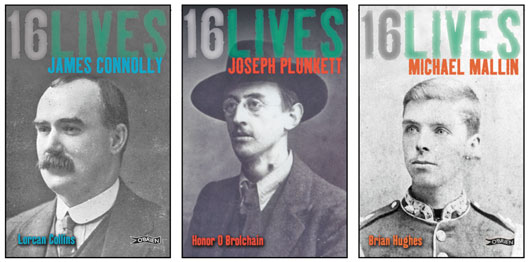2 April 2012 Edition
1916 - Still the central event in our history
Book Review – 16 Lives Series

These books are very attractive in format and are a commendable undertaking for the 1916 centenary. I look forward to the 13 to follow.
THE decade of centenaries now beginning will have at its centre the 100th anniversary of the 1916 Rising. That is right and proper because the Easter Rising and the Proclamation of the Irish Republic remains the central event of our history.
Some seek to deny this truth. Former Fine Gael Taoiseach John Bruton (Irish Times, 21 March) is worried that to commemorate the Irish revolution is to follow Pearse in “glorifying death and violence”. The ex-leader of Fine Gael is a self-confessed Redmondite - a follower of Irish Parliamentary Party leader John Redmond. Tens of thousands of young Irishmen were persuaded by Redmond and by unionist leader Edward Carson to join the British Army and perish as cannon fodder in the imperialist carnage of the First World War. There is not and never can be any equivalence between the call of Pearse and the 1916 leaders to their compatriots to fight for Irish freedom and the disastrous recruitment of a generation of Irish youth - both nationalist and unionist - to fight and die for what Connolly called “the Brigand Empire”.
These debates will become sharper as we approach the 1916 centenary and they will be fuelled by growing numbers of publications and events. O’Brien Press is to be congratulated for undertaking biographies of all 16 of the republican leaders executed after the Easter Rising. The first three are now available.
James Connolly, Michael Mallin and Joseph Plunkett are contrasting figures yet representative of the forces that made the Irish revolution.
Connolly, by 1916, was a veteran revolutionary, hardened in struggle on two continents.
Joseph Plunkett came from a privileged background but chose what he called in a poem “the dark way” that led ultimately to the execution yard in Kilmainham Jail.
And Michael Mallin of the Citizen Army was a skilled tradesman and a family man with a pregnant wife and four children.
Libraries have been written about James Connolly yet Lorcan Collins’s book is still a useful addition - a concise and very readable biography.
As far as I know, this is the first biography of Michael Mallin and Brian Hughes has done a good job.
These men were not perfect; the author does not hesitate to address the attempt by Mallin at his court-martial to shift responsibility onto Constance Markievicz, in the hope of avoiding execution and in the belief that a woman would not be executed.
Of these first three in the series, the most significant and comprehensive is Joseph Plunkett by Honor Ó Brolcháin. Her grandmother, Geraldine, was Joseph Plunkett’s sister and Honor has inherited extensive family papers. This makes for an intimate biography of a fascinating man. Ireland lost much by his execution. He was a talented writer and a principled political activist. Like his fellow poets, PH Pearse and Thomas McDonagh, he was on the side of the workers in the 1913 Lock-Out and this proved to be a key experience in his development as a revolutionary.
These books are very attractive in format and are a commendable undertaking for the 1916 centenary. I look forward to the 13 to follow.




